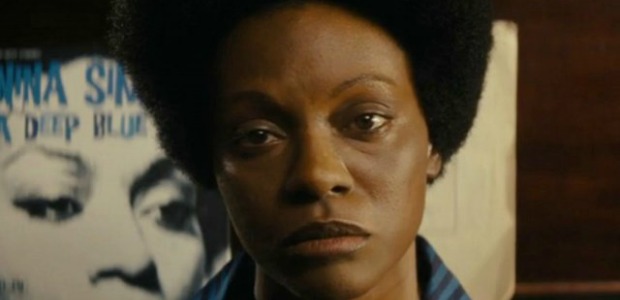The seismic legacy of Nina Simone’s career and songs can’t be understated. Easily one of the greatest singers, musicians and personalities in pop music history, Nina Simone’s impact still reverberates to this day. That doesn’t automatically mean that she deserves a biopic, though. Especially one that primarily revolves around Nina Simone (Zoe Saldana) in her later years acting in her famously volatile manner while her inexperienced manager/nurse Clifton Henderson (David Oyelowo) tries to rebuild her career by putting on a free concert in New York. But that’s what Nina provides us with, and it’s just not enough to warrant a film. What makes Nina even worse is that it expects you to enter the cinema already invested in the character and her plight, and doesn’t try to earn it.
Nina Simone’s past, success, sorrow, illness, and even the exact year are all vaguely hinted at, and while there are eruptions of her famous anger and demands, it all feels like it’s been ripped straight from another biopic. Which is especially apparent to anyone who saw the recently released Oscar nominated documentary What Happened, Miss Simone?, which provides a vivid, touching, and captivating insight into the singer, and is everything that Nina is not.
In order to try and create a cinematic exuberance and actually shed some light onto Nina Simone’s past, Nina zig-zags away from the main narrative to sequences of her assisting a nervous Richard Pryor, playing Young, Gifted And Black for Lorraine Hansberry, being interviewed, and a montage of her drifting away from her daughter. But while Don Cheadle’s Miles Davis biopic Miles Ahead did the same with pizzazz, Nina just carelessly plods and shoe-horns its back-story in, and, in the process, fails to add any prestige to the character or her past.
Nina also fails because of just how dull the relationship and interactions between Nina Simone and Clifton Henderson are, as she just repeatedly abuses him and he has to stand there and take it. It seems like the end to another movie, as we’re not given enough insight into their relationship to relate or understand, while there’s also a meagre spark between Zoe Saldana and David Oyelowo to keep you entranced.
But the glaring reason why Nina doesn’t work is Zoe Saldana’s casting. Upon her very first scene as Nina Simone I genuinely winced and felt uncomfortable at how mark darker she’d been made for her role, a feeling that’s exacerbated because she is preceded by a young African-American girl playing a 13-year-old Nina Simone, while it also doesn't help that Zoe Saldana has become so recognizable thanks to her roles in Star Trek, Avatar, and Guardians Of The Galaxy.
It’s an issue that is impossible to get beyond. Especially since Nina tackles themes of race and inequality due to Nina Simone’s prominent role during the Civil Rights movement. Zoe Saldana’s performance lacks any genuine soul and never feels anything more than a hollow caricature, while there are seldom human touches and details to her characterization to forge a bond between the film and the audience.
There are some brief moments of honest, sincerity, and talent in Zoe Saldana’s musical performances. But these are the only positives of a film that’s somehow so bad its blatant blacking up of its lead actor is actually the least of its problems.












